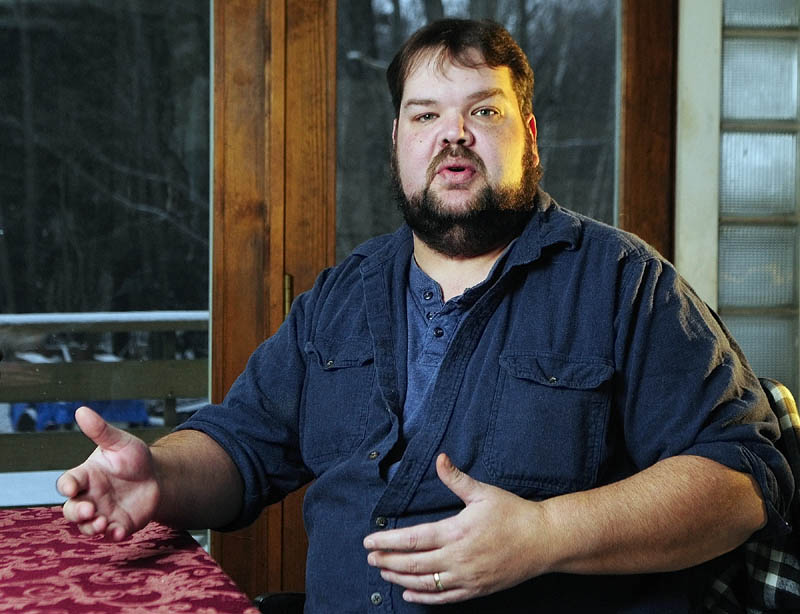GARDINER — Ken King dreamed of becoming a professional barber, but state licensing requirements stood in his way.
The rules said he could only become a licensed barber after completing a 2,500-hour apprenticeship.
King, 42, of Gardiner, a taxidermist, said he wanted to open a barber shop, but couldn’t commit that much time as an apprentice. So he turned to Gov. Paul LePage for help.
“I emailed him in May and he responded almost immediately, within three or four days,” King recalled. “They got a bill introduced that changed the barbering law so people like myself could get a license. I was overwhelmed by such a quick response.” It was signed into law the end of June.
The bill, L.D. 1560, allows licensed cosmetology schools such as the Capilo Institute in Augusta to offer limited barbering courses so people like King could get a license another way.
But even though the new law took effect last year, King still can’t become a barber. State officials were expected to write policy rules before the law took effect, but that never happened.
King said he doesn’t understand the holdup, even as LePage and other government officials talk about the need to create new businesses and more jobs in Maine.
“It’s just I hear about a faster government and the importance of creating jobs and all that stuff,” King said. “This is something that could have been very simple to create jobs. I could go to work as soon as I get out of school.”
Anthony Coco, president of the Capilo Institute, said several people who are interested in becoming licensed barbers have contacted the cosmetology school. But he has had to turn them away — in some cases to other states — because of the holdup with the new law.
“We’ve actually been approved to offer the (barbering) program,” Coco said. “There hasn’t been any type of barbering classes in Maine for over 15 years. This definitely is an opportunity for those who want a career in barbering.”
King was frustated enough that last year he called Jeri Betts, board administrator for the Department of Professional and Financial Regulation, to find out what was going on. King said he was told the rules would be written by November. That was pushed back to December, then January, and most recently, by March.
King said he feels like he’s getting a runaround by the state and that he should have been able to hit the ground running shortly after the new law took effect last summer.
Messages were left for Betts who referred questions to Doug Dunbar, spokesman for the Department of Professional and Financial Regulation.
Dunbar said the legislation required rule-making and updates in several areas of barbering and cosmetology.
“The process, which involves a series of steps, including a public comment period, is moving forward, but it’s a large undertaking,” Dunbar said.
He said the department wants to make sure there are no unnecessary delays in rule-making. The policy will be issued this month, Dunbar said.
The final rules may differ somewhat from a policy statement that will be issued soon by Anne Head, director of the Office of Professional and Regulation, but the department will work with schools on any differences, Dunbar said.
He said the department was pleased to create this new limited-barber license through the legislation.
“We’re hoping it will create new opportunities, new jobs and perhaps new small businesses,” he said. “The policy statement should allow the process to move forward expeditiously.”
Maine has 476 licensed barbers.
Mechele Cooper — 621-5663
mcooper@centralmaine.com
NEW LAW
Under “An Act to Update Professional and Occupational Licensing Statutes,” a person is eligible to obtain a barbering license for the practice of limited barbering if the person:
* is at least 17 years old;
* has satisfactorily completed the 10th grade in a secondary school or its equivalent;
* has satisfactorily completed a course of instruction in the practice of limited barbering of 800 hours in not less than five months in a school licensed by the director, or has experience in the practice of limited barbering as a trainee of 1,600 hours distributed over a period of at least 10 months; and
* has passed an approved examination.
The bill, L.D. 1560, also created a limited barber license and included additional changes to the cosmetology status, as well as changes to laws pertaining to other programs offered by the Department of Professional and Financial Regulation.
GRANTING LICENSES
Schools interested in offering barber licenses should contact the administrator of the state’s barbering and cosmetology program at 624-8579 or www.maine.gov/pfr/professionallicensing/professions/barbers/index.ht.
Send questions/comments to the editors.



Success. Please wait for the page to reload. If the page does not reload within 5 seconds, please refresh the page.
Enter your email and password to access comments.
Hi, to comment on stories you must . This profile is in addition to your subscription and website login.
Already have a commenting profile? .
Invalid username/password.
Please check your email to confirm and complete your registration.
Only subscribers are eligible to post comments. Please subscribe or login first for digital access. Here’s why.
Use the form below to reset your password. When you've submitted your account email, we will send an email with a reset code.